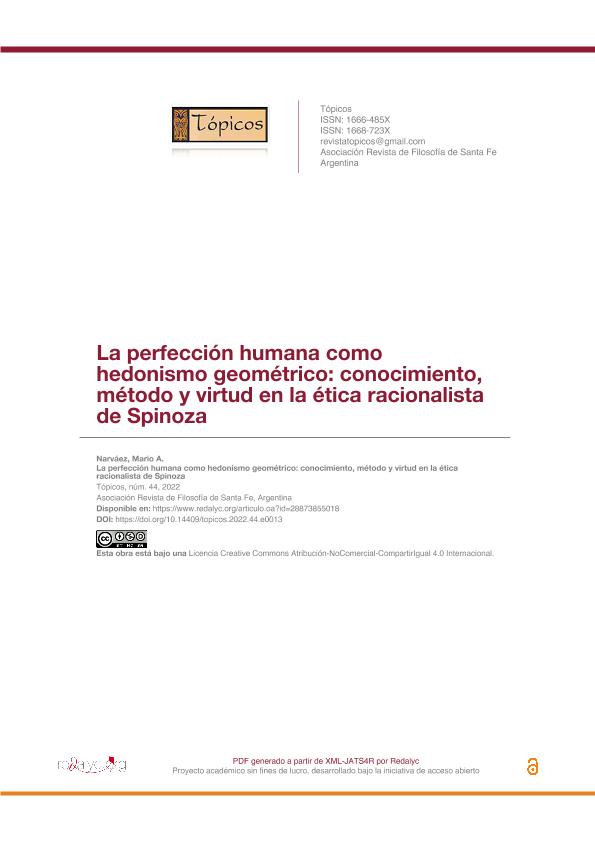Artículo
El tratado metodológico de Spinoza, llamado Tratado de la reforma del entendimiento, introduce al lector con la declaración de un objetivo puramente ético, la obtención de la felicidad. Ésta, identificada con la virtud, es también el objetivo último de la filosofía. Es evidente, por lo tanto, que existe una relación entre el método y la ética, pero su naturaleza no es del todo clara. Así pues, cabe preguntarse: ¿se trata de una relación que puede presentar algún tipo de interés en la comprensión de la teoría ética de Spinoza o es meramente una relación accidental? Dicho de otro modo, ¿los procedimientos metodológicos tienen una función constitutiva en la búsqueda de la virtud o se trata solo de una relación mediata y carente de interés filosófico? En el presente trabajo nos proponemos indagar cuál es la naturaleza de esta relación, partiendo de la hipótesis de que reviste un interés filosófico que es necesario clarificar. Con este fin abordaremos otras cuestiones en torno a la relación entre la virtud y el conocimiento, en especial en torno al modo en que dicha relación aparece planteada en la Ética de Spinoza. Spinoza’s methodological treatise, called Tractatus intellectus emendatione, introduces the reader with a declaration of a purely ethical objective, the obtaining of happiness. is happiness, identified with virtue, is also the ultimate goal of philosophy. It is evident, then, that there is a relationship between method and ethics. But its nature is not clear enough. us, it is worth asking: is this a relationship that may present some kind of philosophical interest in understanding of Spinoza’s ethical theory or is it merely an accidental relationship? In other words, do methodological procedure have a constitutive function in the search of virtue or is it only a mediate relationship lacking in philosophical interest? In the present paper we propose to inquire which is the nature of this relationship starting om the hypothesis that it have a philosophical interest which needs clarification. To this end, we will address other questions about the relationship between virtue and knowledge, specially about the way in which such relationship appears raised in Spinoza’s Ethics.
La perfección humana como hedonismo geométrico: conocimiento, método y virtud en la ética racionalista de Spinoza
Título:
Human perfection as geometric hedonism: knowledge, method and virtue in Spinoza’s rationalist ethics
Fecha de publicación:
12/2022
Editorial:
Asociacion Revista de Filosofia de Santa Fe
Revista:
Topicos
ISSN:
1666-485X
Idioma:
Español
Tipo de recurso:
Artículo publicado
Clasificación temática:
Resumen
Palabras clave:
HEDONISM
,
KNOWLEDGE
,
METHOD
,
SPINOZA
,
VIRTUE
Archivos asociados
Licencia
Identificadores
Colecciones
Articulos(CCT - PATAGONIA CONFLUENCIA)
Articulos de CTRO.CIENTIFICO TECNOL.CONICET - PATAGONIA CONFLUENCIA
Articulos de CTRO.CIENTIFICO TECNOL.CONICET - PATAGONIA CONFLUENCIA
Citación
Narváez, Mario Andrés; La perfección humana como hedonismo geométrico: conocimiento, método y virtud en la ética racionalista de Spinoza; Asociacion Revista de Filosofia de Santa Fe; Topicos; 44; 12-2022; 1-18
Compartir
Altmétricas




